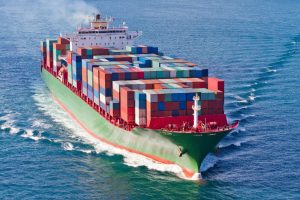Did you know that sea shipping in Singapore is responsible for significant environmental impacts? With ship emissions contributing to air pollution and marine pollution causing ecosystem degradation, there is a pressing need for sustainability efforts. Moreover, the carbon footprint of sea shipping has far-reaching climate change impacts. In this article, we will explore the environmental challenges faced by sea shipping in Singapore and the various sustainability initiatives being implemented to combat these issues.

Environmental Challenges Faced by Sea Shipping in Singapore
When it comes to sea shipping in Singapore, you face a number of environmental challenges. The first challenge is air pollution caused by ship emissions. The burning of fossil fuels in ship engines releases sulfur dioxide, nitrogen oxides, and particulate matter into the atmosphere, contributing to poor air quality and health issues. Another challenge is water pollution, mainly caused by oil spills and discharge of untreated ballast water. These pollutants harm marine life and ecosystems, leading to long-term ecological damage. Noise pollution is also a concern, as ship engines, propellers, and underwater noise disrupt the natural behaviors of marine animals, affecting their communication and navigation. Lastly, the shipping industry contributes to greenhouse gas emissions, exacerbating climate change. To address these challenges, Singapore has implemented regulations and initiatives, such as the use of cleaner fuels, ballast water management systems, and emission control areas, to promote sustainability in sea shipping.
Air Pollution From Ship Emissions
To address air pollution from ship emissions, you need to take proactive measures in Singapore. Ship emissions, particularly from burning fossil fuels, contribute significantly to air pollution and climate change. These emissions contain harmful pollutants such as sulfur dioxide, nitrogen oxides, and particulate matter, which can have detrimental effects on both human health and the environment. In response to this issue, Singapore has implemented several measures to reduce air pollution from ships. These include the mandatory use of low sulfur fuel by ships at berth, the promotion of cleaner fuel alternatives, and the adoption of emission control technologies. Additionally, the Maritime and Port Authority of Singapore (MPA) has introduced incentives for ships to adopt energy-efficient practices and technologies, further reducing their environmental impact. These proactive measures are crucial in mitigating air pollution from ship emissions and ensuring a sustainable future for sea shipping in Singapore.
Marine Pollution and Ecosystem Degradation
Reducing marine pollution and ecosystem degradation is essential for sustainable sea shipping in Singapore. The marine environment in Singapore is facing significant challenges due to the negative impacts of shipping activities. These activities result in the release of pollutants, such as oil spills and chemical discharges, which can have severe consequences for marine life and ecosystems. Marine pollution not only harms the biodiversity of the area but also affects the livelihoods of coastal communities that rely on fishing and tourism. To address this issue, Singapore has implemented strict regulations and measures to prevent and control marine pollution. These include the use of cleaner fuels, ballast water management, and waste management practices. Additionally, the country has established protected areas and marine parks to conserve and restore marine ecosystems. Collaboration between the government, shipping industry, and other stakeholders is crucial in ensuring the sustainability of sea shipping and preserving the marine environment in Singapore.
Carbon Footprint and Climate Change Impacts
One way you can address the carbon footprint and climate change impacts of sea shipping in Singapore is by implementing sustainable practices. Sea shipping is a major contributor to greenhouse gas emissions, primarily through the burning of fossil fuels. By adopting sustainable practices, such as using cleaner fuels or investing in more fuel-efficient vessels, shipping companies can significantly reduce their carbon emissions. Additionally, optimizing shipping routes and schedules can help minimize fuel consumption and emissions. Furthermore, implementing technologies like shore power and cold ironing can reduce the need for ships to run their engines while docked, further reducing emissions. It is crucial for the shipping industry in Singapore to actively pursue these sustainable practices to mitigate the climate change impacts associated with sea shipping and work towards a more environmentally friendly future.
